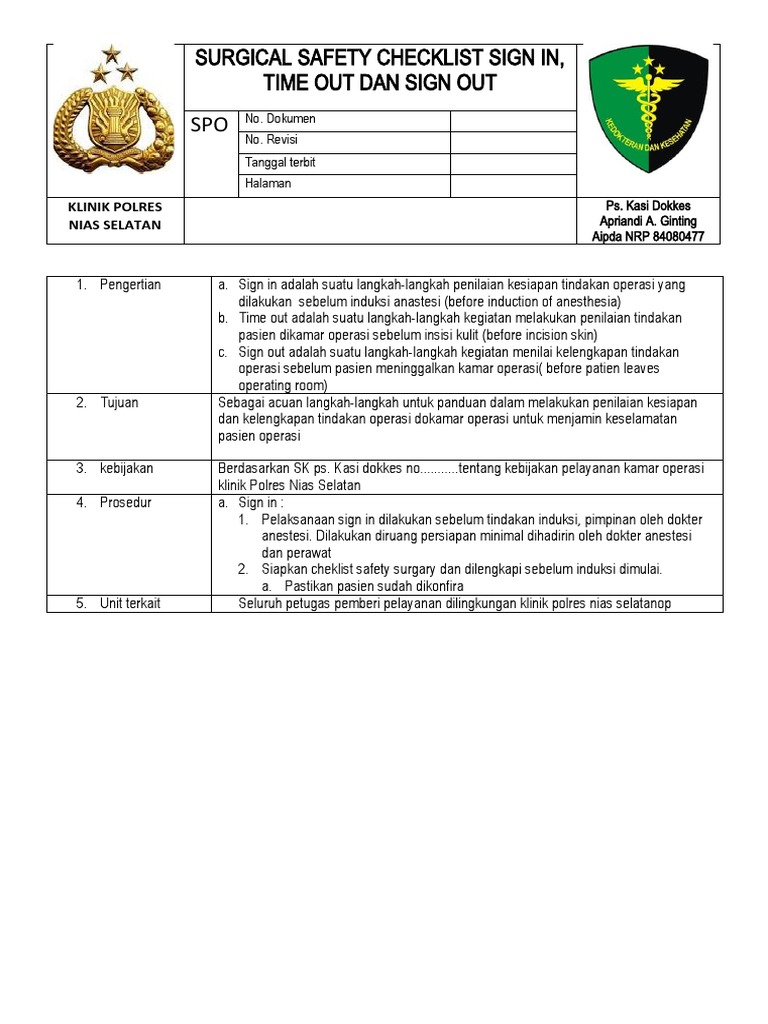Legal Documents You Need Before Surgery: A Checklist

Undergoing surgery, whether elective or necessary, is a significant event in anyone's life. Beyond the medical preparations, there are crucial legal documents one should consider to ensure that in case of an unforeseen outcome, your wishes are respected, and your affairs are in order. Here’s an essential checklist to guide you through the necessary legal documentation before heading into the operating room.
1. Advance Health Care Directive

One of the first documents to consider is an Advance Health Care Directive (AHCD). This legal document outlines your preferences regarding medical treatment if you are unable to communicate your decisions due to your condition.
- Living Will: Specifies which medical treatments you would or would not want, particularly those that prolong life.
- Medical Power of Attorney: Appoints someone you trust to make health care decisions on your behalf when you cannot.
💡 Note: An AHCD ensures that doctors and family members are aware of your wishes, reducing potential conflicts during critical moments.
2. Durable Power of Attorney (DPOA)

While the Medical Power of Attorney deals with health care decisions, a Durable Power of Attorney (DPOA) allows you to appoint someone to manage your financial and legal affairs if you become incapacitated.
- Can be specific or general.
- Stays in effect even if you lose mental capacity.
3. HIPAA Authorization

The Health Insurance Portability and Accountability Act (HIPAA) sets privacy rules for medical information. An authorization form allows specific individuals to access your health information:
- Direct family members.
- Close friends or caregivers.
- Legal representatives.
4. Organ Donation Authorization

If you're interested in donating your organs or tissues after surgery or in the event of death, ensure to:
- Sign up as an organ donor through the relevant state registry.
- Inform your family, as they might need to confirm your decision.
- Carry a donor card or mark your driver's license accordingly.
5. Last Will and Testament

A Last Will and Testament specifies how your assets should be distributed, who will take care of your minor children, and who will manage your estate. Here's what you should ensure:
| Legal Document | Action |
|---|---|
| Executor | Appoint a trusted individual to execute your will. |
| Guardianship | State who will care for any minor children. |
| Beneficiaries | Name who will inherit your assets. |

6. Do Not Resuscitate Order (DNR)

If you do not want to be resuscitated in case of cardiac or respiratory arrest, a DNR Order should be in place:
- Can be signed by you and your physician.
- Should be clearly communicated with your healthcare team.
🔥 Note: A DNR must be renewed periodically as per your state's laws to remain valid.
7. Physician Orders for Life-Sustaining Treatment (POLST)

A POLST form complements an AHCD by translating your wishes into medical orders. It's particularly useful for those with serious or chronic illnesses and includes:
- CPR decisions
- Preferences for medical interventions
- Antibiotics and artificial nutrition
🧐 Note: POLST forms are typically in color-coded formats to ensure they are easily recognizable during emergencies.
8. Letter of Instruction

A Letter of Instruction isn't legally binding but provides your executor with essential details about your wishes:
- Location of important documents.
- Funeral and burial preferences.
- Contact information for important people or entities.
Ensuring you have these legal documents prepared before surgery is crucial. They provide peace of mind, knowing that your wishes regarding medical treatment, your financial affairs, and your assets will be respected in case you're unable to make decisions. It's also worth mentioning that regular review and updates of these documents are advisable, especially as your circumstances or wishes change.
Why do I need all these legal documents before surgery?

+
These documents ensure that in the event of an emergency, your medical treatment preferences and financial decisions are made according to your wishes by people you trust.
Can’t my family make these decisions without formal documentation?

+
While family members might be considered in making decisions, without formal legal documentation, there could be disagreements, and medical professionals might not act without clear consent. Legal documents provide clarity and authority.
How often should these documents be reviewed?

+
It’s recommended to review these documents annually, or when there are significant changes in your health, family structure, or personal wishes.
Do these documents need to be notarized or witnessed?

+
Yes, most of these documents require notarization or witnesses to be legally valid. State laws vary, so consult with a legal professional or your state’s guidelines.
What if I change my mind about my wishes?

+
You can amend these documents at any time. However, you must follow the legal procedures for each document type to ensure they remain valid and enforceable.